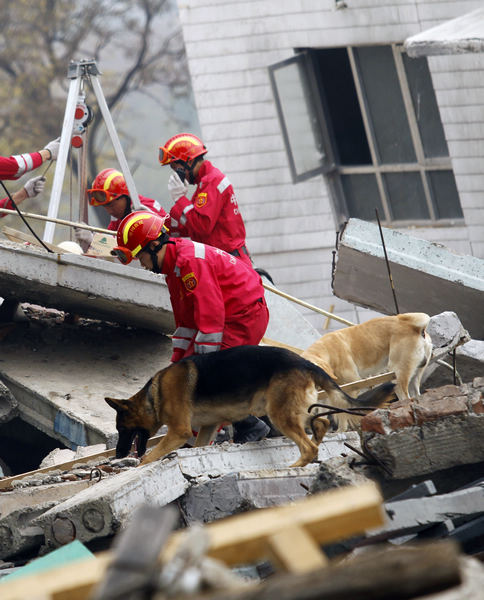|
|||||||||||
Editor's note: Established in 2001, the China Search and Rescue Team has 480 members and has helped save 69 people's lives during their work in the wake of disasters at home and abroad. In late October, China Daily reporter Cao Yin caught up with some new and experienced members at the team's training base in the western mountains of Beijing.
 |
|
Members of the China Search and Rescue Team take part in a drill at its training base in Beijing on Nov 3. Photos by Feng Yongbin / China Daily |
Yang Huining could not hide her excitement whenever the topic turned the missions she may one day be a part of the China Search and Rescue Team.
As one of the 50 new recruits this year, the 37-year-old was on the last day of a grueling two-week training program, yet she looked as energetic and eager as if it was her first.
|
 |
"I can't wait to send my training videos home and tell my daughter about how meaningful her mother's work is," said Yang, a doctor with the General Hospital of the Armed Police Forces in Beijing. "My girl is only 6 and I want to set a brave example for her."
To say the training took Yang out of her comfort zone would be an understatement. Simulations carried out on the base's large, mock disaster site involve jumping from two-floor buildings, diving into deep wells and scaling ropes high above the ground - and that's just to get to the "victims" to treat them.
It was a far cry from the hospital wards where this slim, 165-cm-high doctor normally performs her work.
"My mother was worried about me doing something so dangerous, and some of my colleagues also doubted my physical ability, but I still insisted on following my dream," Yang said, as she took a break outside her dormitory."I had to spend a long time persuading my mother I would be OK, and I also wrote a five-page application to my boss so he'd allow me to take part in the program."
Her husband, on the other hand, could not have been more pleased about her decision to try out for the team.
"He's a soldier and he was involved in the rescue operations in Sichuan province after the 2008 earthquake," she said. "He helped me mentally prepare and told me the differences between helping people on the operating table and in a disaster zone."
Reserves for the China Search and Rescue Team are called to the capital twice a year for training. After the first course, recruits are qualified to only receive more mid- to high-level training. They cannot go into the field until after six months.
Like Yang, People's Liberation Army soldier Liu Li, 24, was struggling to contain his excitement about the prospect of dealing with a national or international emergency.
"I'm over the moon to be joining the team, as only excellent soldiers are selected," he said, adding that he was planning that night to call his parents back in Hunan province to tell them all about what he had learned at the base.
"I am very proud, but what I really want now is to rescue people in a real disaster," he added.
At that moment, Yang and Liu were called for another simulation drill. They picked up their gear and ran without a second's hesitation.
Hot Topics
HIV/AIDS, Egypt protest, Thanksgiving, climate change, global economic recovery, home prices, high-speed railways, school bus safety, Libya situation, Weekly photos
Editor's Picks

|

|

|

|

|

|







